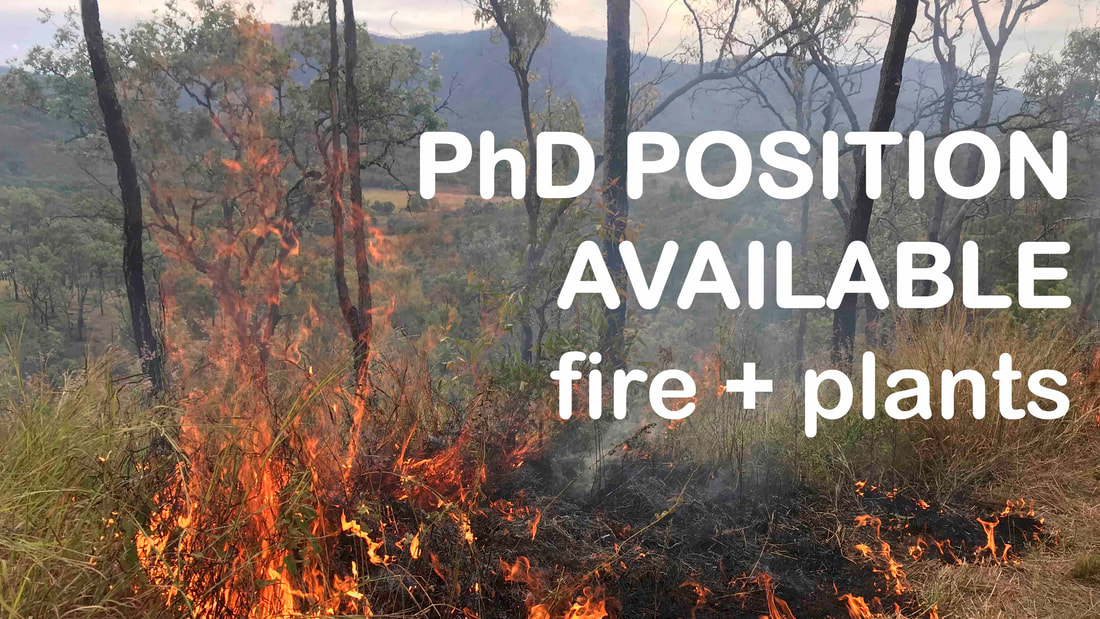Managing interactions between fire regimes and invasive plants
Supervisors: Dr Annabel Smith & Dr Shane Campbell
Location: University of Queensland, Australia
A long history of fire has shaped many ecosystems globally, but thousands of species are now threatened with extinction because climate change, inappropriate management and invasive plants are rapidly changing fire regimes. Effective fire management is more complex than simply re-instating a historical fire regime because ecosystems might require a specific initial management regime (e.g. more frequent burning) to re-establish native plant communities and increase their resilience to future invasion.
In this project, we will establish an evidence-based management framework for grassy woodlands in southeast Queensland, by evaluating how variation in fire frequency affects the composition and function of native plant communities. Our innovative landscape-scale fire experiment will tackle invasive grasses across the Hidden Vale Research Station to secure and restore Australian native species and ecosystems for future generations.
We will educate a PhD student to become an emerging leader in fire management for plant conservation. The successful candidate will be trained by a botanist to identify native and non-native grassland flora and develop a botanical database documenting plant functional traits. The student will develop high-level technical skills in data analysis, scientific writing and scientific publication, setting them up for an exciting research career.
Suitable candidates: This project would suit someone with a keen interest in plant ecology and fire management. Applicants should have a strong academic track record and willingness to work in the field with plants and on the computer with data!
Funding is available for the running costs of this project and we are accepting applications for honours and PhD projects.
How to apply: Please contact Annabel ([email protected]) or Shane ([email protected]) with an expression of interest and your CV.
Shortlisted applicants will apply for the for the competitive UQ Graduate School Scholarship for tuition and stipend. Successful candidates will be eligible to apply for the competitive Hidden Vale Wildlife Top-up Scholarship.
Supervisors: Dr Annabel Smith & Dr Shane Campbell
Location: University of Queensland, Australia
A long history of fire has shaped many ecosystems globally, but thousands of species are now threatened with extinction because climate change, inappropriate management and invasive plants are rapidly changing fire regimes. Effective fire management is more complex than simply re-instating a historical fire regime because ecosystems might require a specific initial management regime (e.g. more frequent burning) to re-establish native plant communities and increase their resilience to future invasion.
In this project, we will establish an evidence-based management framework for grassy woodlands in southeast Queensland, by evaluating how variation in fire frequency affects the composition and function of native plant communities. Our innovative landscape-scale fire experiment will tackle invasive grasses across the Hidden Vale Research Station to secure and restore Australian native species and ecosystems for future generations.
We will educate a PhD student to become an emerging leader in fire management for plant conservation. The successful candidate will be trained by a botanist to identify native and non-native grassland flora and develop a botanical database documenting plant functional traits. The student will develop high-level technical skills in data analysis, scientific writing and scientific publication, setting them up for an exciting research career.
Suitable candidates: This project would suit someone with a keen interest in plant ecology and fire management. Applicants should have a strong academic track record and willingness to work in the field with plants and on the computer with data!
Funding is available for the running costs of this project and we are accepting applications for honours and PhD projects.
How to apply: Please contact Annabel ([email protected]) or Shane ([email protected]) with an expression of interest and your CV.
Shortlisted applicants will apply for the for the competitive UQ Graduate School Scholarship for tuition and stipend. Successful candidates will be eligible to apply for the competitive Hidden Vale Wildlife Top-up Scholarship.
